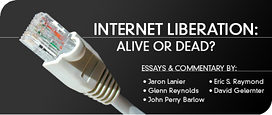There’s something peculiar about the language of libertarians. In a modern American context, terms like “liberation” and “community” are old lefty code-words. They have become nostalgic. They lend a familiarity and warmth to affairs here in crazy Berkeley. Our archaic tropes mean exactly as much as the ubiquitous “frankly” does in D.C. It’s hard for me to imagine that our nonsense words mean something to you guys over in Policy Land, but apparently they do.
I guess the idea is that libertarians are triumphantly re-contextualizing the opponent’s symbols. It’s like using the N-word in a whole new way!
What’s with the obsession with old 60s lefty symbolism? What demons are you guys fighting? Are you still upset with the hippie chicks of old who said Yes to guys who said No? Are you suffering from Lysistrata blowback? It isn’t fair. We don’t go around saying “frankly.” You don’t hear Berkeley protesters in the streets yelling, “Frankly, we should impeach Bush!”
So that’s why it’s hard for me to address the idea of Internet liberation head on. Which oppression are we expecting to be liberated from? The idea isn’t well framed. Internet-supported self-improvement, Internet adventure, Internet-based economic development, Internet-based pleasures; these are all ideas that make sense to me.
My wife had to escape the Soviet Union when the wall was still in place, and what my parents and their parents went through under Nazis and Tsars was unspeakable. I have thankfully never had the potential to experience liberation.
It seems to me the rhetorical charge underlying of the Internet liberation question is something like, Isn’t it true that this is yet another case where the promises of the 60s Left turned out to only be realizable by Free Markets? The problem is that some of those old promises didn’t exactly make sense in the first place, so you guys don’t make sense either when you use them as points of reference.

